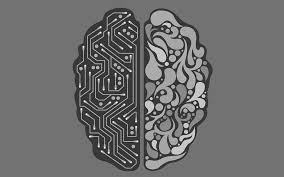Artificial is the opposite of natural. Anything which is born from nature, without the intervention of humans is natural. So, AI can be defined as the science & technology of incorporating natural intelligence in machines. It aims at nothing but incorporating common sense in machines, to ease human lives.
According to the father of AI, John McCarthy, AI is the science & engineering of making intelligent machines.
Seemingly high accessibility to digitization as well as Big data are the key factors which enabled AI’s growth. GPS, internet banking, etc. are made possible by huge internet accessibility. Entry of public cloud has revolutionized connectivity. Most of the digital devices around us are connected & this has ended up in an unimaginable amount of data. This collection of analyzable data,which is known as big data has facilitated R&D in AI, by producing insightful information.
Researchers in AI use complex programming to replicate human cognitive abilities in machines. Some of the major areas where AI will be highly beneficial are:
Generic applications
- For error Reduction – AI can be used to reduce errors and to achieve greater degrees of precision. This will be highly useful or tasks which demand high precision, like R&D.
- Jobs which demand high continuity – Robots / Machines will not get tired, and they can be programmed to work continuously without distraction or tiredness.
- In doing monotonous jobs – Machines are faster; Unlike humans, they can also be programmed to adjust parameters like speed and time. Machines can be multi-tasked. Machines will be effective in completing tasks which are repetitive & monotonous.
Specific applications
- Explorations – AI can be very much useful in tasks like Mining & other fuel exploration processes, Ocean floor exploration, Space explorations, etc. to overcome human limitations. Machines (Robots) will not wear out easily; Robots can also be made more laborious as well as responsible via programming.
- Medical applications – In the medical field, artificial surgery simulators are already in use for training purposes. Various high-end diagnostic machines used by doctors as part of the patient’s health verification uses AI. Radiosurgery is another major application of AI, using which surgeries can be done without damaging surrounding tissues.
- Digital Assistants – In humans, emotions can change mental state which affects judgement & decision making, resulting in inefficiency. Since emotions are absent, robots will be more logical and can always take effective decisions. Digital assistants, which uses AI will be extremely beneficial in doing specific tasks (like digital reminders, etc.), eliminating human intervention.
- Daily life applications – AI has been used heavily in our daily life today. Major examples include smartphones which are inevitable in our lives; GPS systems, which we use for travelling, etc.. In today’s world, important transactions like banking are highly AI enabled by technologies like smart cards. Machine intelligence is working when we take a picture, as well as using tags in social media.
AI can increase growth in various ways. Major ones are through,
i) Incorporating intelligence in automation – this can be done by enabling,
i)a. AI in complex physical tasks (Example – implementing robots to work in a warehouse).
i)b. Decision-making ability via AI (Example – a natural language processing support system which can support maintenance engineers from remote locations by the help of manuals).
i)c. Self-learning ability via AI (Example – a support system which can escalate a problem to a human coworker & which can learn from it).
ii) Labor enhancements – AI systems can actually increase HR efficiency. This can be done by placing AI systems to do repetitive or similar tasks; which will enable HR to concentrate on their core roles which adds more value. (Example – using AI systems for room delivery in hotels, enabling human staff to concentrate only on their major responsibilities, which will increase efficiency.)
iii) Enabling more innovation – AI generates new opportunities & requirements. (Example – Driver less cars are enabling more R&D, it will also give more free time to drivers which again will result in the rise of new opportunities).

But, these following factors are AI’s disadvantages: Huge cost; Inability to replicate humans (because machines lack emotions & moral values, machines are unable to encounter unfamiliar situations); Inability to improve with experience (machines only wear and tear with time, they cannot learn & improve like humans); Lack of original creativity (Machines cannot bring in creativity or imagination, intuitive ability of humans is natural); Unemployment threat (Replacement of humans by machines can result in unemployment) are disadvantages of AI. So, researchers need to focus on making AI more useful for humans in order to increase efficiency and ease of operation. In that way, AI’s positives can outweigh its negatives. Let’s wait for many more from AI.
